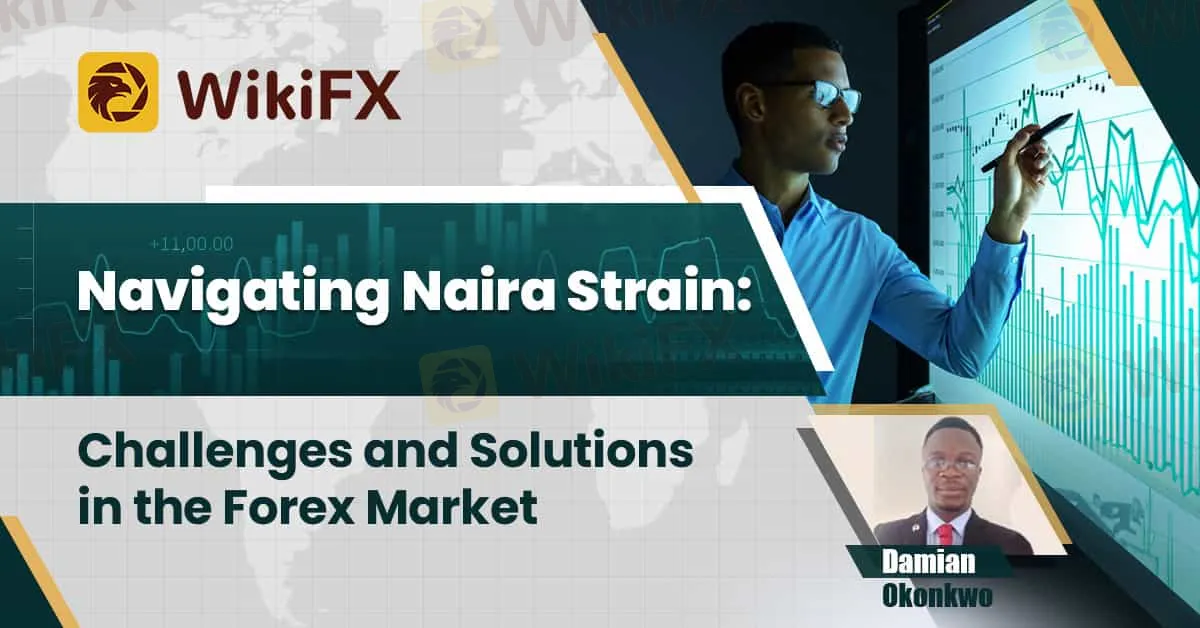简体中文
繁體中文
English
Pусский
日本語
ภาษาไทย
Tiếng Việt
Bahasa Indonesia
Español
हिन्दी
Filippiiniläinen
Français
Deutsch
Português
Türkçe
한국어
العربية
Navigating Naira Strain: Challenges and Solutions in the Forex Market
Abstract:The Nigerian Naira has been under pressure in recent times, grappling with currency depreciation and heightened volatility in the foreign exchange (forex) market. Experts attribute this strain to a confluence of factors, especially the dollar scarcity amidst the high supply of Naira in the market.

By: Damian Okonkwo

Naira Continuous devaluation: Understanding the Challenges:
The Nairas strong devaluation recently has been attributed to several factors:
● Demand-Supply Imbalance: Nigeria's reliance on imported goods creates a constant demand for foreign currency, while oil export earnings, the nation's primary source of forex, have fluctuated due to global oil price movements. This imbalance puts pressure on the Naira's value.
● Policy Uncertainty: Concerns regarding government policies, such as capital controls and exchange rate management strategies, can deter foreign investors and lead to capital flight, further weakening the Naira.
● Global Economic Pressures: Global factors like rising inflation and interest rate hikes by major economies can lead to capital outflows from emerging markets like Nigeria, impacting the Naira's exchange rate.
Navigating the Naira devaluations in the Forex Market:
There are some important strategies that investors could apply to withstand the Naira devaluations. Among them are:
● Hedging Strategies: Businesses and individuals can utilize hedging instruments like forwards, futures, and options contracts to mitigate forex risk and protect their financial positions from adverse currency fluctuations.
● Diversification: Diversifying forex exposure by investing in a basket of currencies can help reduce risk associated with the Naira's depreciation.
● Prioritizing Local Alternatives: Supporting domestically produced goods and services can help reduce reliance on imports and ease demand pressures on foreign currency.
Government Policy and Long-Term Solutions:
The government too has got some important roles to play towards reviving the Naira again. These can include:
● Promoting Non-Oil Exports: Encouraging the diversification of the export base by fostering the growth of non-oil exports can generate alternative sources of forex inflows and reduce dependence on oil revenue.
● Foreign Investment Incentives: Implementing policies that attract foreign direct investment (FDI) can bring in much-needed capital, promote job creation, and boost economic growth.
● Building External Reserves: Maintaining healthy external reserves provides a buffer against external shocks and helps stabilize the forex market during periods of volatility.
Conclusion
The current forex market situation in Nigeria presents a complex landscape, demanding a nuanced approach. By understanding the challenges, adopting appropriate risk management strategies, and advocating for long-term solutions, individuals and businesses can contribute to a more stable and predictable financial environment, fostering economic prosperity in Nigeria.

Disclaimer:
The views in this article only represent the author's personal views, and do not constitute investment advice on this platform. This platform does not guarantee the accuracy, completeness and timeliness of the information in the article, and will not be liable for any loss caused by the use of or reliance on the information in the article.
Read more

10 Signs of a Fake Forex Trading or Crypto Website
Been to a forex trading or crypto website promising guaranteed returns, displaying too good to be true testimonials and far too many impressive features? Beware, it's a SCAM! In this article, we discuss 10 signs of a fake forex trading or cryptocurrency website.

Know the Red Flags before Investing in Primarkets
Knowing the red flags of FX Broker is the most important act while you are thinking to invest your money in the Forex market and are enthusiastic about Forex trading.

Never Invest in These 5 "No License”- Scam brokers
These are scam brokers operating without licenses. Therefore, it becomes risky to trust these brokers for Forex trading. These brokers will most probably swindle your money and make you penniless. To avoid this situation, check out the list below carefully. This is the warning list issued by the Financial Conduct Authority (FCA).

What WikiFX Found When It Looked Into Emar Markets
Before working with any online broker, it’s important to check their licenses and how they operate. Emar Markets is one such broker that has come under review. Although it claims to be regulated in South Africa, further checks show some warning signs that traders should not ignore.
WikiFX Broker
Latest News
XTB Hack 2025: Major Security Breach Exposes Client Accounts
These are America's 10 weakest state economies most at risk in a recession
These are America's 10 strongest state economies best prepared for a recession
Federal Reserve quietly responds to Trump administration attacks over renovation
Tariff Windfall Drives Surprise $27 Billion US Budget Surplus In June
Top Wall Street analysts are upbeat about these dividend-paying stocks
Singapore's economy grows 4.3% in second quarter, beating expectations
In middle of Trump's trade war, importers hold more cash and move inventory off the books
Asia-Pacific markets trade mixed as investors assess Trump's latest tariff threats; bitcoin hits new highs
Gold Soars Above $3,350 as XAU/USD Rallies on Trade Tensions
Currency Calculator



